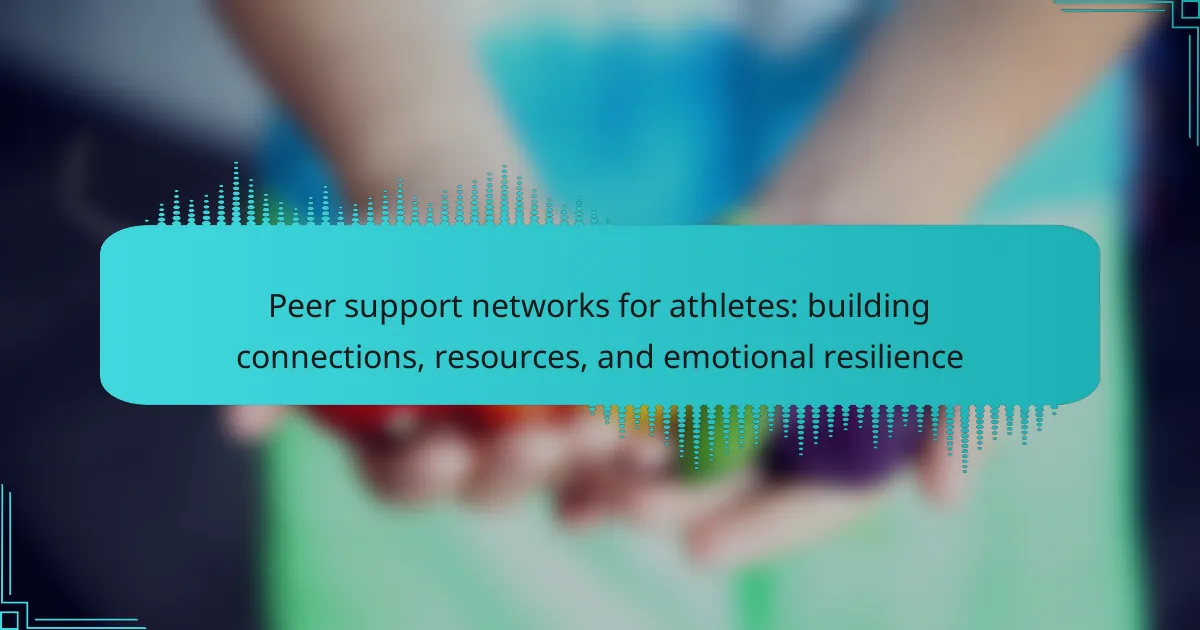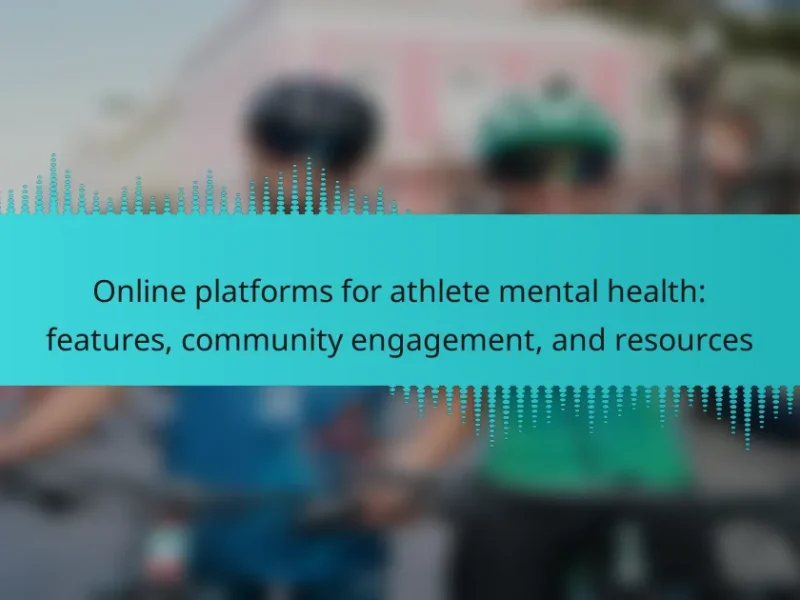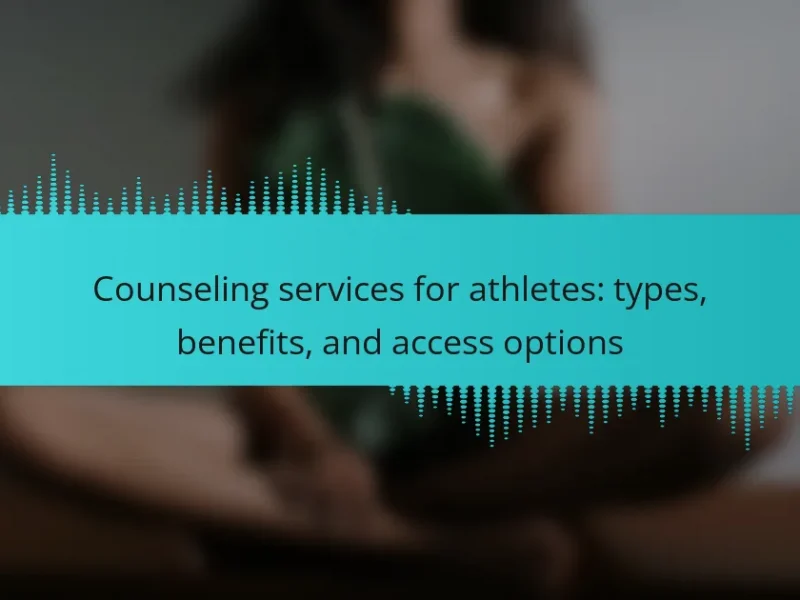Peer support networks for athletes enhance emotional resilience and well-being. They provide vital resources like mentorship and coping strategies while fostering connections among athletes. These networks reduce isolation and improve mental health outcomes through shared experiences. Engaging effectively in these networks involves building trust, regular communication, and structured support practices.
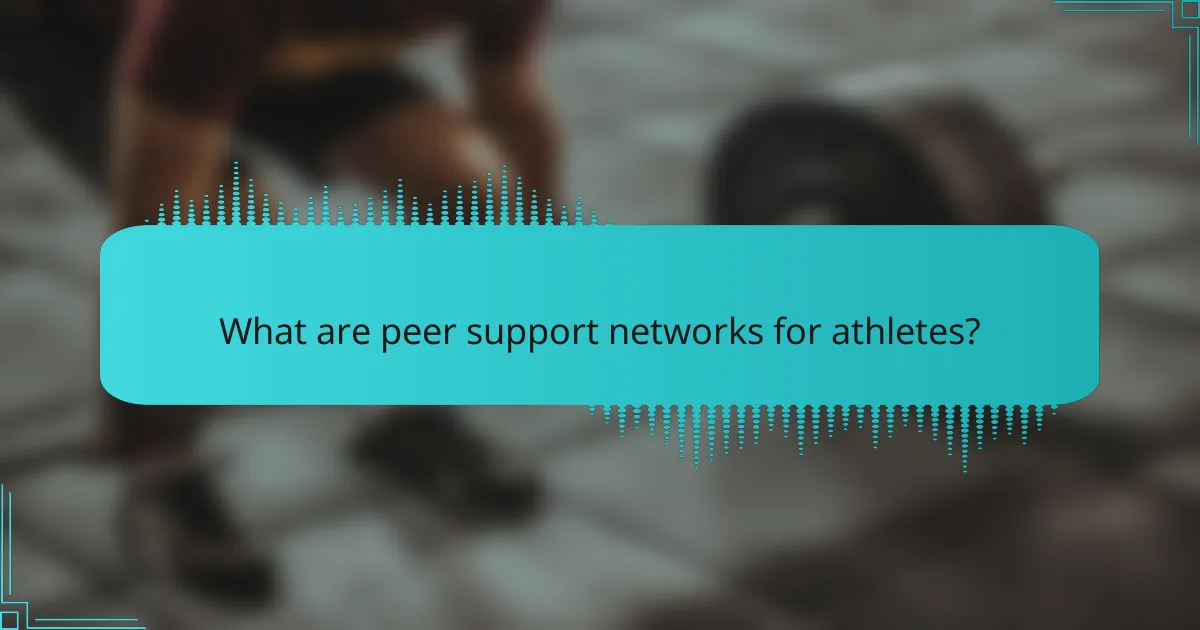
What are peer support networks for athletes?
Peer support networks for athletes provide crucial emotional and social support. These networks foster connections among athletes, enhancing their resilience and well-being. They offer resources such as mentorship, shared experiences, and coping strategies, which are essential for managing the pressures of competitive sports. Engaging in these networks can lead to improved mental health outcomes, as athletes share challenges and successes, creating a sense of community and belonging.
How do these networks foster emotional resilience?
Peer support networks foster emotional resilience by providing athletes with a sense of belonging and shared experiences. These connections reduce feelings of isolation and promote open communication about mental health challenges. Additionally, access to resources and coping strategies shared within the network enhances emotional well-being. For example, athletes may learn mindfulness techniques or stress management skills from peers, which can significantly improve their mental resilience.
What role do connections play in athlete performance?
Connections significantly enhance athlete performance by providing emotional support, resources, and resilience. Peer support networks foster a sense of belonging, which boosts motivation and reduces stress. Research indicates that athletes with strong social ties experience improved mental health and greater overall satisfaction in their sport. These connections also facilitate resource sharing, such as training tips and recovery strategies, ultimately leading to better performance outcomes. Emotional resilience, cultivated through supportive relationships, enables athletes to navigate challenges more effectively, enhancing their competitive edge.
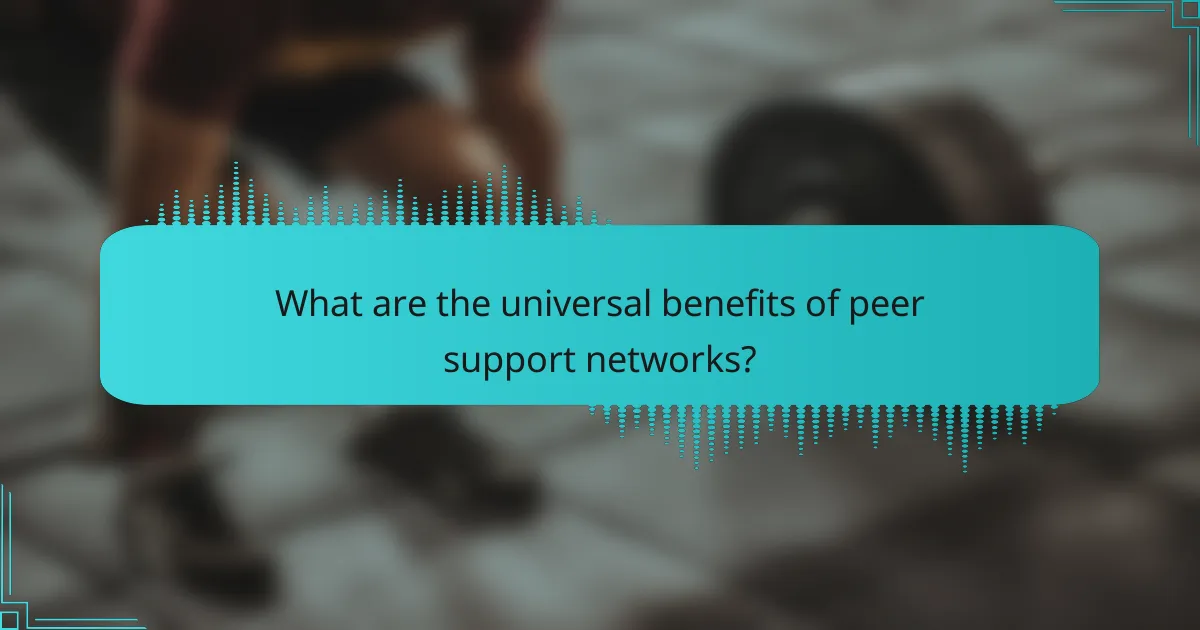
What are the universal benefits of peer support networks?
Peer support networks for athletes offer vital emotional resilience, resource sharing, and connection building. These networks enhance mental health, reduce feelings of isolation, and foster a sense of belonging. Athletes gain access to shared experiences, which can improve coping strategies and increase motivation. Research indicates that peer support can lead to improved performance and overall well-being, as athletes feel understood and valued within their community.
How do they enhance mental health and well-being?
Peer support networks enhance mental health and well-being by fostering connections and emotional resilience among athletes. These networks provide a safe space for sharing experiences, reducing feelings of isolation. Participants often report improved stress management and increased motivation. The unique attribute of peer support is its relatability, as athletes understand each other’s challenges. As a result, these networks contribute significantly to overall mental health, promoting a sense of belonging and community.
What resources do they typically provide?
Peer support networks for athletes typically provide emotional support, resources for mental health, and opportunities for networking. They may offer workshops on resilience, access to professional guidance, and platforms for sharing experiences. These networks foster a sense of community, which is crucial for athletes facing challenges. Additionally, they can connect athletes with mentors who have unique insights into overcoming adversity.
In what ways do they improve team dynamics?
Peer support networks for athletes enhance team dynamics by fostering trust, communication, and collaboration. These networks provide emotional resilience and shared resources, leading to improved performance. For example, athletes can share experiences and strategies, which strengthens connections. Additionally, the unique attribute of mutual understanding among peers creates a supportive environment, encouraging openness and vulnerability. As a result, athletes feel more connected, leading to increased motivation and cohesion within the team.
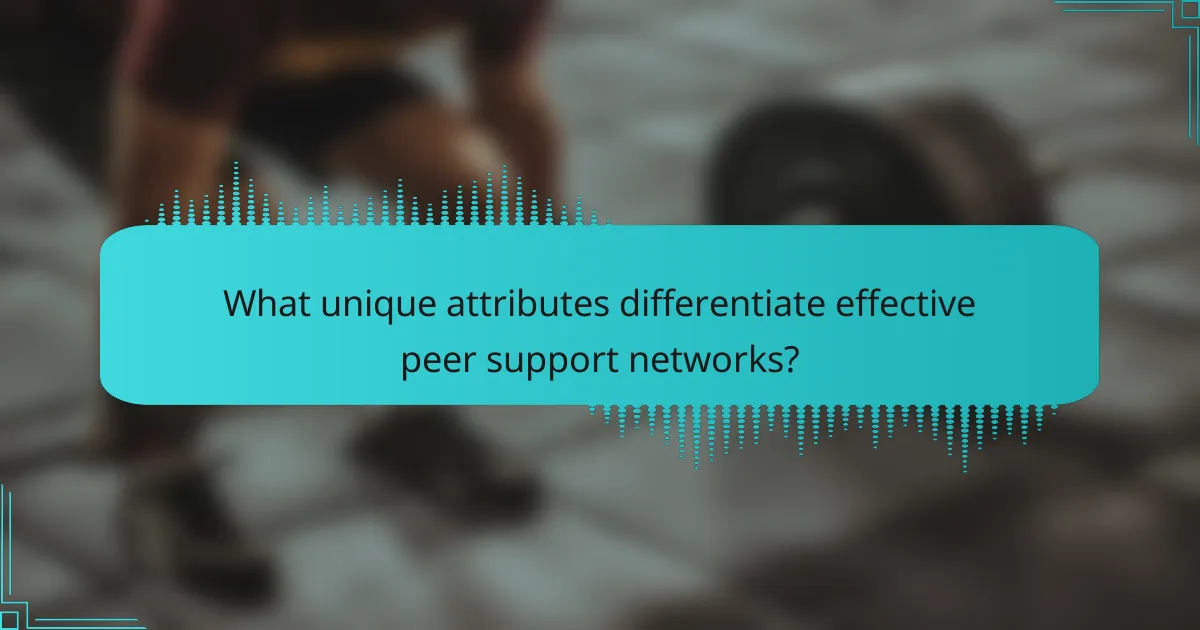
What unique attributes differentiate effective peer support networks?
Effective peer support networks for athletes are distinguished by their focus on shared experiences, emotional understanding, and resource accessibility. These networks foster trust and collaboration, enabling athletes to discuss challenges openly. Unique attributes include specialized training for peer supporters, tailored resources for different sports, and a structured feedback mechanism to enhance engagement. Additionally, rare attributes like cultural sensitivity and inclusivity can significantly enhance the effectiveness of these networks, creating a safe space for diverse athletes.
How do cultural factors influence these networks?
Cultural factors significantly shape peer support networks for athletes by influencing communication styles, values, and social norms. For example, collectivist cultures may emphasize group cohesion and shared experiences, fostering stronger emotional bonds. In contrast, individualistic cultures might prioritize personal achievement, affecting the nature of support provided. Additionally, cultural attitudes towards mental health can determine the openness of athletes in seeking and offering emotional support. Understanding these dynamics enhances the effectiveness of peer networks and promotes resilience among athletes.
What are the characteristics of successful peer support leaders?
Successful peer support leaders possess strong communication skills, empathy, and the ability to foster trust. They actively listen, provide constructive feedback, and encourage open dialogue among athletes. Their unique attribute is the capability to connect emotionally, creating a supportive environment. Additionally, they are knowledgeable about resources available to athletes, enhancing their resilience. Effective leaders also model positive behaviors and promote inclusivity, ensuring every athlete feels valued and heard.
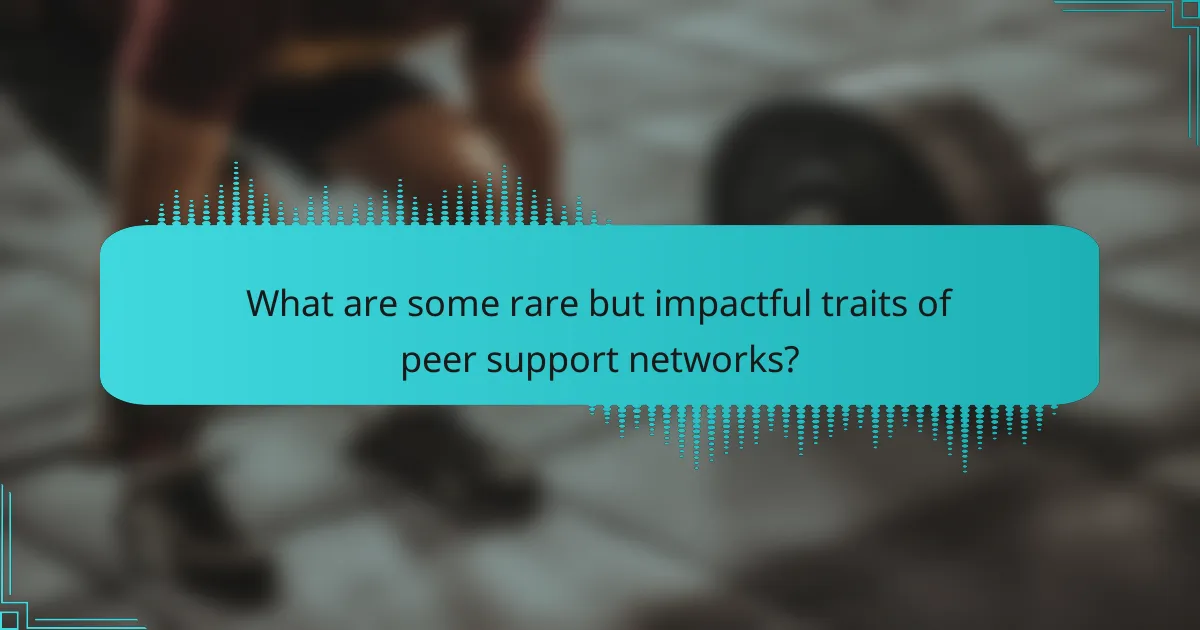
What are some rare but impactful traits of peer support networks?
Peer support networks for athletes often exhibit rare but impactful traits that enhance their effectiveness. One unique trait is the ability to foster trust among members, creating a safe space for sharing vulnerabilities. This trust leads to deeper emotional connections, which are crucial for mental resilience. Another rare attribute is the presence of specialized knowledge sharing, where seasoned athletes provide insights that are not widely available, enhancing collective wisdom. Additionally, these networks can facilitate unique mentorship opportunities, connecting younger athletes with experienced peers who offer guidance tailored to individual needs. Lastly, the diversity of experiences within these networks can lead to innovative problem-solving approaches, as varied perspectives contribute to more comprehensive support strategies.
How do specific sports influence the structure of these networks?
Specific sports significantly shape peer support networks for athletes by fostering unique connections and resources. Team sports like basketball and soccer create a collaborative environment, enhancing emotional resilience through shared experiences. Individual sports, such as tennis or swimming, may lead to smaller, more intimate networks, focusing on personal growth and motivation. The structure of these networks often reflects the sport’s culture, influencing the types of support athletes receive. For instance, endurance sports may prioritize mental toughness, while team sports emphasize camaraderie. Overall, the dynamics within these networks are crucial for athletes’ well-being and performance.
What innovative practices have emerged in recent years?
Peer support networks for athletes have gained traction, focusing on emotional resilience and resource sharing. These networks foster connections among athletes to combat isolation and enhance mental health. Recent innovations include virtual platforms that facilitate real-time peer interactions, allowing athletes to share experiences and strategies. Additionally, structured mentorship programs have emerged, pairing experienced athletes with newcomers for guidance and support. These practices help build a sense of community and promote well-being in competitive environments.
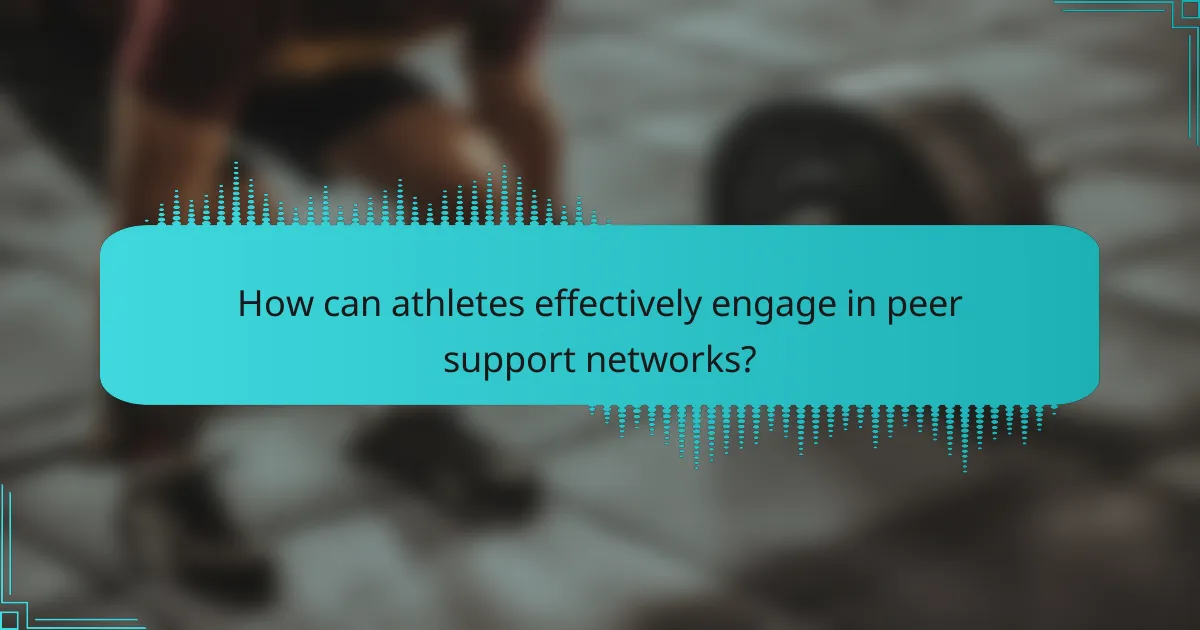
How can athletes effectively engage in peer support networks?
Athletes can effectively engage in peer support networks by actively participating in group activities, sharing experiences, and providing mutual encouragement. Building trust is essential for emotional resilience. Regular communication strengthens connections and fosters a sense of belonging. Establishing clear goals within the network can enhance motivation and accountability.
What strategies can athletes use to build connections?
Athletes can build connections through peer support networks that enhance emotional resilience and provide resources. Engaging in team-building activities fosters trust and camaraderie. Regular communication through group chats or social media strengthens relationships. Participating in workshops focused on mental health and well-being promotes shared experiences. Additionally, mentorship programs offer guidance and support, creating a sense of belonging. These strategies collectively contribute to a supportive environment crucial for athletic success.
What common mistakes should athletes avoid?
Athletes should avoid neglecting their mental health, isolating themselves, and ignoring feedback from peers. Building a supportive network enhances emotional resilience and performance. Common mistakes include underestimating the importance of communication, failing to seek help, and not participating in team dynamics. Prioritising peer connections can lead to improved coping strategies and overall well-being.
How can athletes maintain long-term relationships within these networks?
Athletes can maintain long-term relationships within peer support networks by fostering open communication and mutual trust. Regular check-ins and shared experiences strengthen bonds. Engaging in collaborative activities, such as training sessions or team events, enhances connection. Additionally, recognizing and celebrating each other’s achievements promotes a supportive atmosphere.
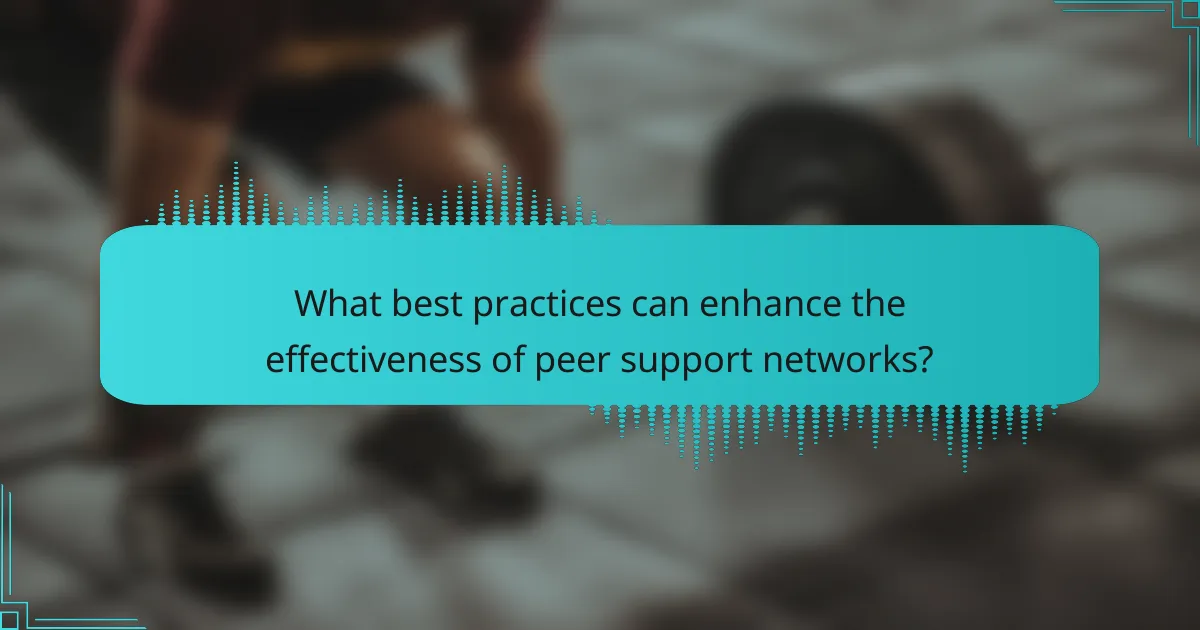
What best practices can enhance the effectiveness of peer support networks?
Building effective peer support networks for athletes involves fostering strong connections, access to resources, and enhancing emotional resilience. Key practices include creating structured meetings, ensuring confidentiality, and promoting active listening.
1. Establish regular check-ins to maintain engagement.
2. Provide training for peer supporters to enhance their skills.
3. Use technology to facilitate communication and resource sharing.
4. Encourage sharing of personal experiences to build trust.
5. Measure the effectiveness of the network through feedback and surveys.
These practices not only strengthen the network but also contribute to athletes’ overall mental health and performance.
How can technology facilitate these connections?
Technology enhances peer support networks for athletes by providing platforms for communication, resource sharing, and emotional support. Social media enables real-time connections, allowing athletes to share experiences and advice. Mobile applications offer access to mental health resources, fostering emotional resilience. Virtual meetups facilitate community building, breaking geographical barriers. Data analytics can identify trends in athlete well-being, guiding targeted support initiatives. Overall, technology streamlines connections and enhances the support system for athletes.
What role do mentorship programs play in these networks?
Mentorship programs play a crucial role in peer support networks for athletes by fostering connections and enhancing emotional resilience. These programs provide guidance, resources, and a sense of community, which can significantly improve an athlete’s mental health and performance. Mentors share personal experiences, offering unique insights that help mentees navigate challenges. As a result, athletes develop stronger coping strategies and build lasting relationships that extend beyond their sports careers.
How can athletes leverage their networks for personal growth?
Athletes can leverage their networks for personal growth by building strong connections, accessing resources, and enhancing emotional resilience. Engaging with peers fosters collaboration, knowledge sharing, and support during challenges.
Peer support networks provide athletes with diverse perspectives, which can lead to improved performance. For instance, sharing training techniques or mental strategies can enhance skills and confidence.
Additionally, emotional resilience is cultivated through these connections. Athletes can discuss setbacks, receive encouragement, and develop coping strategies, which are crucial for overcoming obstacles.
In summary, effective networking not only enhances performance but also supports mental well-being, creating a holistic approach to an athlete’s development.
